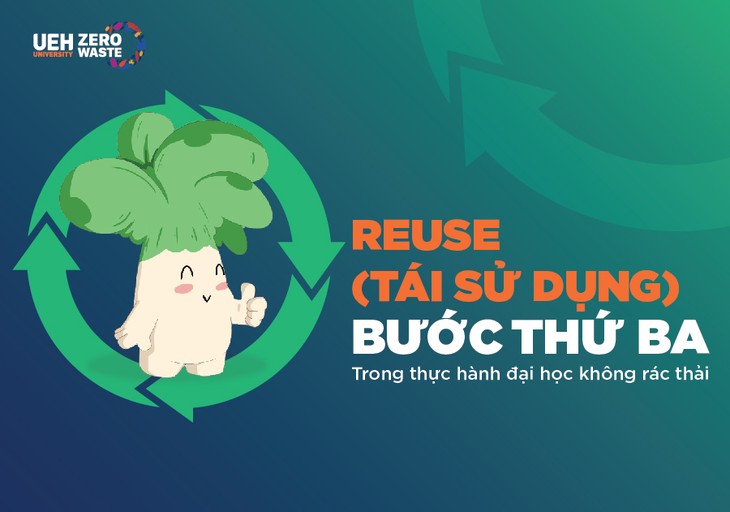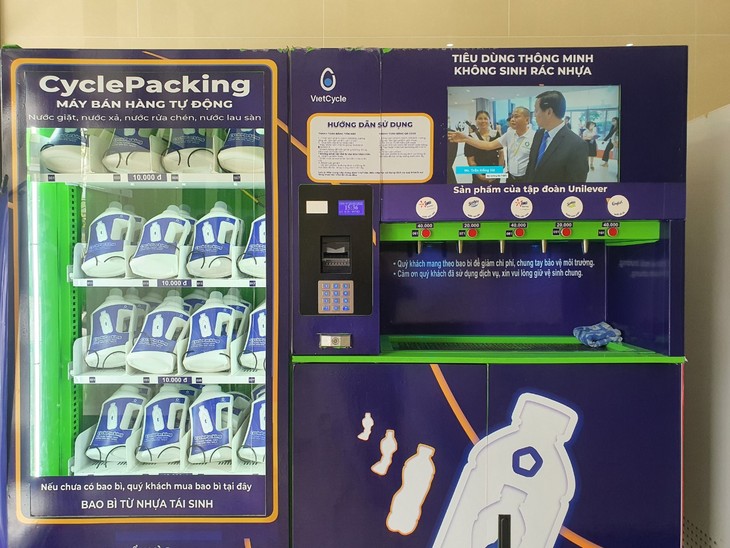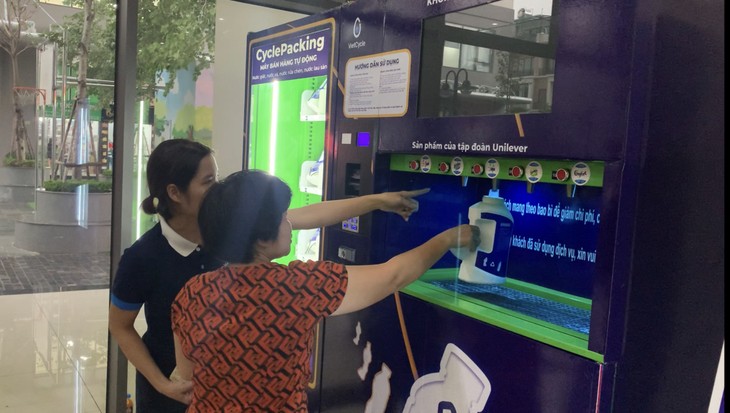 The University of Economics Ho Chi Minh City is applying 3R Model to waste management at the school campus and reuse is the third step in zero waste university practice there. (Photo credit: UEH) The University of Economics Ho Chi Minh City is applying 3R Model to waste management at the school campus and reuse is the third step in zero waste university practice there. (Photo credit: UEH)
|
The term ‘circular economy’ was first used by Pearce and Turner in 1990 to refer to an economic model in which everything is an input for something else, a very different model from the traditional linear economy.
Dr. Lai Van Manh of the Institute of Strategy and Policy on Natural Resources and Environment, said at a recent webinar on "Reuse and the Circular Economy" that reuse is prioritized in a circular economy, adding that reuse lengthens a product’s life cycle, thus reducing waste.
Business participation
Dr. Manh took phone repair, for example, saying that it creates jobs for lots of Vietnamese workers and prolongs the life cycle of a product.
“Repair, renewing, and reuse are ways to lengthen a product’s life cycle, thereby decreasing the depletion of natural resources, the level of emissions, and negative impacts on the environment. All this is contained in Article 142 of the Law on Environmental Protection,” said Dr. Manh.
He added that e-commerce, including the Internet of Things, promotes the resale of second-hand products.
As a result, according to Dr. Manh, businesses need to determine a product’s life cycle and reuse right at the design stage.
“Of many circular economy solutions, reuse is one of the most advantageous approaches with probably less cost,” said Dr. Manh, adding, “Of course, in the future, sorting will also be a tool to promote reuse. But right now businesses should include the extension of a product’s life cycle in the product design stage. That will be the success of the circular economy.”
State support through policies, legal frameworks
Over the past few decades, Vietnam has become one of the production hubs in Asia, with rapid economic growth and greater consumption.
To sustain this growth and create a healthier, happier society through social and environmental improvements, Vietnam is trying to move from a linear to a circular economic model.
In 2020 Vietnam promulgated the Law on Environmental Protection, which is focused on developing a circular economy. A decree issued in January 2022 stipulated criteria, a roadmap, and mechanisms to spur economic development.
The Ministry of Natural Resources and Environment has been assigned to coordinate with functional agencies at all levels in formulating and submitting to the Prime Minister a national action plan for the circular economy.
Dr. Manh said that, with reuse considered a priority solution for creating a circular economy, what Vietnam is discussing in the national action plan is whether to implement reuse by product or by sector.
“No matter which approach is used – by businesses, households, residential areas, or urban areas – we must consider the future methods of reuse in all these models,” according to Dr. Manh.
New development models
To achieve a circular economy, and make reuse a habit for everyone, businesses has been involved with new reuse models. Now let’s take a look at two such models.
The Vietcycle Corporation, a pioneer in environmental protection by reducing plastic waste in Vietnam, has created something it calls the CyclePacking vending machine to promote the circular economy.
 (Photo credit: Vietcycle Corporation) (Photo credit: Vietcycle Corporation) |
The machine was introduced to the first customer at a residential area in Hanoi’s Thanh Tri district. It was also displayed at the Circular Economy Forum Exhibition in Hanoi and impressed both domestic and foreign visitors.
Vietcycle machine is a solution that automates sales transactions. Customers bring their own containers to be refilled by the machine for laundry detergent, softener, dishwashing liquid, and floor cleaner, and pay via a QR code.
This solution enables reusing packaging, reducing plastic packaging waste and changing shopping habits, according to Nguyen Thi Hoang My, the company’s Deputy Director.
 CyclePacking is said easy to use for all regardless age (Photo credit: Vietcycle Corporation) CyclePacking is said easy to use for all regardless age (Photo credit: Vietcycle Corporation) |
CyclePacking is a smart consumption program that doesn’t create plastic waste and creates a revolution in sustainable consumer awareness, said My, adding, “It aims to spread a message to every household and community about combating plastic waste pollution. The amount of plastic packaging will be reduced by encouraging consumers to change their shopping habits and reuse packaging. Our target is reducing plastic waste by 90 million kilograms and carbon emissions by 54 million kilograms by 2027.”
My said Vietcyle is working with Central Retail, a leading Thai retailer, to install CyclePacking vending machines in shopping malls, supermarkets, residential areas, and traditional markets.
Quach Thi Xuan, coordinator of the Vietnam Zero Waste Alliance, has suggested that the Muuse reuse model used by Singapore be applied in Vietnam.
Under this model, customers buy coffee using the company's cups or takeaway containers, scan the cup's QR code with Muuse software to pay, and then return the cups at collection points. The cups are disinfected and used again to serve new customers.
According to Xuan, the model is very feasible for the beaches in Da Nang, for example, where there are many bars and cafes.
“Although a number of them use recyclable bags or cups, most still use single-use items. A company that has the support of State policy and capital from the municipal government can make product reuse successful and reduce plastic waste,” said Xuan.
In Europe, people prefer products with recycled content. Garbage bags, for example, must have 70% recycled materials.
In Vietnam soft packaging for fabric softener or dishwashing liquid is preferred to hard containers.
Hoang Duc Vuong, Chairman of the Vietcycle Corporation and Chairman of the Recycled Plastics Association, said that international organizations have estimated that for every kg of plastic you use, you emit 6 kg of carbon into the atmosphere.
“That means Vietcycle’s CyclePacking vending machine could greatly reduce the amount of carbon emitted into the atmosphere. We hope that when there is a carbon exchange and carbon credits with developed countries, we can make money from credit trading. This combines environmental protection with turning carbon credits into profitable goods," said Vuong.
As environmental pollution and resource depletion are leaving severe impacts on human life, a circular economy is essential for a more sustainable world.
In June 2022 Deputy Prime Minister Le Minh Khai signed a decision approving the project of developing circular economy in Vietnam. The project aims to contribute to reducing greenhouse gas emissions intensity per unit of GDP by at least 15% by 2030 compared to 2014 and achieving net-zero carbon emissions by 2050.